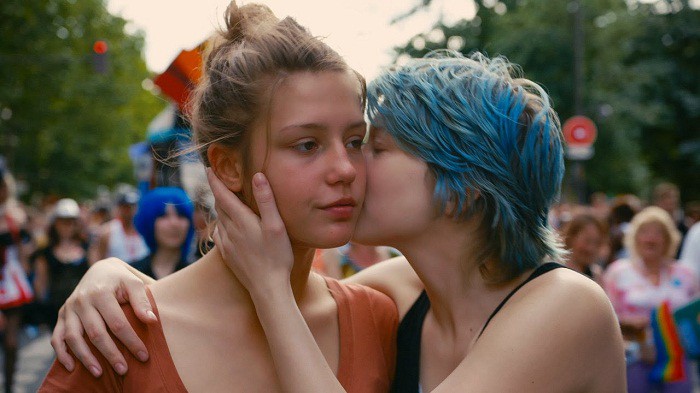There’s no doubt when Abdellatif Kechiche’s Blue is the Warmest Color hits theaters today it will cause controversy. The movie has already experienced the both praise and backlash from critics, its own director and lead actresses.
Winner of this year’s Palme d’Or at Cannes, the first queer film to do so, follows Adele (Adele Exarchopoulos), a reserved teenager. She goes
to school, hangs out with her friends and spends time with her family. Adele’s friends are soaked in hormones — constantly chatting about boys and sex.
Adele seems uncomfortable in joining on their conversations. She soon starts seeing a guy from school and their lackluster sexual encounters can’t compete
with her seconds-long run in on the street with a beautiful blue haired girl. And when Adele finally meets Emma (Lea Seydoux) and they connect — it is
completely electric.
The film’s treatment of the budding romance between Adele and Emma hits the audience in their softest, squishiest parts. Their first shared glance on the
street echoes real chance encounters in our lives — locking eyes across a bar, a silent smile on the subway — but it becomes an actual relationship instead of the ones we imagine within those moments.
Due to the tremendous performances of Exarchopoulos and Seydoux, our investment in the pair’s relationship is immediate from their second
encounter at a lesbian bar through their budding friendship. The two fall fast and furiously in love — a love that is all encompassing in its scope — one
that only allows the room for the two of them to exist.
The film excels at painting a portrait of the relationship between the two women — one that spans the years through passionate beginnings, restless
domestication, familial comfort and bitter squabbles. The film’s failure, at least for me, was Adele. This isn’t to say that Exarchopoulos doesn’t
given a spectacular performance, she plays a woman who is all consumed by her relationship which is at times uncomfortably realistic. But if
we look at Blue as a decidedly queer coming of age story about a woman who is figuring out her identity as a lesbian and experiencing her first love — we
never know Adele well enough to fully experience her journey.
We only experience Adele in bits and pieces. We see her
with her family sharing many a meal. Joyfully hanging out with her friends and later angrily standing up for herself against them. We see her nervousness
and bravery as she goes to a lesbian bar, alone, for the first time. As she grows older, Adele works as a teacher which she clearly has a gift for. And in her relationship with Emma, we see her discomfort interacting with Emma’s rich, snooty art friends — a subtle hint at the class
divide between the two. But once her relationship with Emma begins, all else seems to fade into the background — the spaghetti-feeding parents, the mean
girl friends — the identifiers of Adele’s life outside of Emma. There is no one.
This isn’t to say that this isn’t a realistic situation — the friends who disappear for some time only to resurface after a breakup. The hard part to watch is how Adele’s identity becomes so entwined in Emma’s that she doesn’t appear to exist outside her. While Adele’s isolation makes the conclusion of the film all the more tragic, the emotional response feels manipulated because the story is
structured from Adele’s point of view. We are supposed to experience Adele’s story, her journey to figuring out herself. By the end of the film, Adele has become so wrapped up in Emma that it doesn’t even feel like it is about her anymore — she has no outside connections outside Emma, seemingly no interests and seems no more sure of herself than when we started. We are never entirely privy to Adele’s interior life and that feels like a missed and much needed opportunity to tell the coming of age story of this woman.
While I applaud much of the film and fell in love with Adele, Emma and their story — I want my heroines — gay or straight — to have full, rich interior selves
that can exist outside of their relationships and survive without them.






